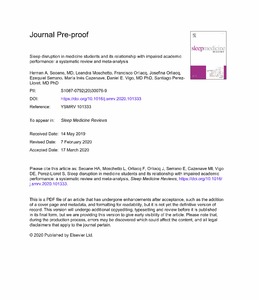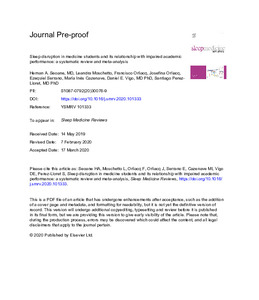Please use this identifier to cite or link to this item:
https://repositorio.uca.edu.ar/handle/123456789/10108| Título: | Sleep disruption in medicine students and its relationship with impaired academic performance : a systematic review and meta-analysis | Autor: | Seoane, Hernán A. Moschetto, Leandra Orliacq, Francisco Orliacq, Josefina Serrano, Ezequiel Cazenave, María Inés Vigo, Daniel Eduardo Pérez Lloret, Santiago |
Palabras clave: | TRASTORNOS DEL SUEÑO; SUEÑO; ESTUDIANTES UNIVERSITARIOS; MEDICINA; RENDIMIENTO ACADEMICO | Fecha de publicación: | 2020 | Editorial: | Elsevier | Cita: | Seoane, H. A. Sleep disruption in medicine students and its relationship with impaired academic performance : a systematic review and meta-analysis [en línea]. Postprint del artículo publicado en Sleep Medicine Reviews. 2020, 53. doi:10.1016/j.smrv.2020.101333 Disponible en: https://repositorio.uca.edu.ar/handle/123456789/10108 | Resumen: | Summary: Sleep disruption severely impairs learning ability, affecting academic performance in students. This systematic review and meta-analysis aimed at assessing the prevalence of sleep disruption in medical students and its relationship with academic performance. PubMed, Web of Sciences, EBSCO and SciELO databases searches allowed to retrieve 41 papers with data about the prevalence of sleep deprivation, 20 of which also contained data on its association with academic performance. Poor sleep quality was reported by 5646 out of 14,170 students in 29 studies (39.8%, 95% confidence interval = 39.0–40.6%), insufficient sleep duration by 3762/12,906 students in 28 studies (29.1%, 23.3–29.9%) and excessive diurnal sleepiness by 1324/3688 students in 13 studies (35.9%, 34.3–37.4). Academic grades correlated significantly with sleep quality scores (r, 95% CI = 0.15, 0.05–0.26, random-effects model; p = 0.002, n = 10,420 subjects, k = 15 studies) and diurnal sleepiness (r = −0.12, −0.19/−0.06 under the fixed effects model, p < 0.001, n = 1539, k = 6), but not with sleep duration (r = 0.03, −0.12/0.17 under the random-effects model, p = 0.132, n = 2469, k = 9). These findings advocate for an urgent intervention aiming at improving sleep quality among medical students as a way of increasing academic achievements and, ultimately, the quality of health care. | URI: | https://repositorio.uca.edu.ar/handle/123456789/10108 | ISSN: | 1087-0792 (impreso) 1532-2955 (online) |
Disciplina: | MEDICINA | DOI: | 10.1016/j.smrv.2020.101333 | Derechos: | Acceso abierto. 12 meses de embargo | Fuente: | Sleep Medicine Reviews. 2020, 53 |
| Appears in Collections: | Artículos |
Files in This Item:
| File | Description | Size | Format | |
|---|---|---|---|---|
| sleep-disruption-medicine-students.jpg | 2 MB | JPEG |  View/Open | |
| sleep-disruption-medicine-students.pdf | 4,85 MB | Adobe PDF |  View/Open |
Page view(s)
293
checked on Apr 30, 2024
Download(s)
4,902
checked on Apr 30, 2024
Google ScholarTM
Check
Altmetric
Altmetric
This item is licensed under a Creative Commons License

